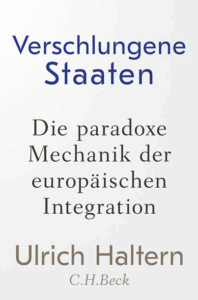The German Rule of Law Is Getting Lost in Islamabad
Law, Order, and the Federal Admission Programme for Afghanistan
Law and order – what could be more conservative than these two words? Law protects contracts and property. It upholds confidence in the continuity of existing structures. It cements power and serves as an instrument of power. Law must rule under the rule of law, and anyone who believes otherwise cannot justifiably call themselves a conservative.
That the conservative Chancellor’s party, the CDU, wants to stop so-called “illegal migration” may thus appear a logical consequence: if migration is to happen, then let it be lawful and orderly. Not people simply showing up irregularly and uncontrolled, but in proper order: submitting an application, presenting documents, undergoing a controlled review – so that the state can distinguish between lawful and unlawful cases based on abstract, general criteria.
One might assume that the Federal Admission Programme for Afghanistan, introduced in 2023, represents the model case for such regulated, orderly, and legal migration. It establishes a process for admitting individuals for whom the Federal Republic bears responsibility after the withdrawal of Allied forces and the Taliban’s return in 2021–people who have been and continue to be persecuted and tortured because of their gender, religion, or sexual identity; people who advocated for women’s rights, democracy, education, and justice; people who, from a Western point of view, did everything right and now must fear for their lives under Taliban rule.
Of course, not all of them. The number of available places is limited at 1,000 per month. One cannot simply show up and join the queue. Candidates must be nominated by an authorised organisation, that is, an NGO familiar with the local context and capable of assessing who is genuinely in need of protection and why. The German government then selects individuals from these nominations based on defined criteria such as vulnerability, ties to Germany, and personal risk – excluding anyone about whom German security agencies have concerns. Applicants must prove their identity with impeccable documentation. If they cannot obtain such documents – perhaps because doing so would require approaching a Taliban authority – they are out of luck.
++++++++++Advertisement++++++++++++
Abuse of the law has many faces. A refugee child is denied a place in a daycare center. An unwelcome journalist is attacked with SLAPPs. A demonstration is given disproportionate conditions. It is important to check this legally. Gegenrechtsschutz helps you to defend yourself. We support suitable cases, arrange legal assistance, and cover the costs.
Are you affected?
Would you like to donate?
++++++++++++++++++++++++++++++++
Those selected receive what is known as an “admission commitment,” a formal administrative act under §23(2) of the Residence Act, through which the Federal Republic undertakes to grant a visa, provided there are no security objections. To apply for the visa, individuals must travel to Islamabad, Pakistan, as the German embassy in Kabul is effectively defunct. There, they are housed in hostels rented by the GIZ (German Agency for International Cooperation) and must wait for the embassy to issue the visa. By this point, they’ve already invested thousands of dollars to obtain documents and fund their travel – often selling everything they own. But further steps remain. A “security interview” with Federal Police officers checks once more whether everything is in order, and whether perhaps a terrorist or sharia preacher has managed to sneak onto the list. Once cleared, the visa is issued, the individual boards a flight to Germany – and they arrive. Legally. In an orderly fashion. This is the rule of law’s dream scenario.
Or so one would think. In reality, what is currently happening in Islamabad looks more like a nightmare for the rule of law. I have recently spoken with several persons closely involved. With Tilmann Röder, until recently the head oft he coordinating team of the admissions programme. With lawyer Matthias Lehnert, who represents many affected individuals. With Eva Beyer from the NGO Kabul Luftbrücke. If what they describe – and some, albeit too few, media outlets are reporting it – is accurate, then my faith in the Federal Republic as a state governed by the rule of law is profoundly shaken.
According to Eva Beyer, around 800 families – about 2,500 people altogether – are currently waiting in Pakistan for Germany to honour its admission commitments. Some have been waiting for over a year. They are stuck in hostels and cannot leave, as venturing outside risks arrest and deportation back to Afghanistan by the Pakistani police. In February, Pakistan gave Afghan refugees awaiting departure a deadline to leave Islamabad by the end of March. The BBC reported in April that 600 to 700 families are being deported each day. The very people whom the German rule-of-law state so meticulously vetted are now effectively imprisoned in hostels, unable to work, their children unable to attend school, many without any money left. They can’t move forward, can’t go back, and can’t stay. As mentioned: these are the most vulnerable of the vulnerable. Eva Beyer cites the case of a man who was nearly tortured to death in an Afghan prison and saved through emergency surgery. He is now waiting for his visa in Pakistan. “Many would probably prefer to kill themselves than return to Afghanistan.”
Some of the waiting individuals received their admission commitment before October 2022, prior to the launch of the formal admission programme. Those commitments were informal – mere emails under §22 of the Residence Act. According to lawyer Matthias Lehnert, these have recently been revoked more and more frequently, and just as informally – “without justification, without legal recourse, without explanation.” Even within the formal programme under §23, Eva Beyer reports that some revocations have already taken place. Once a commitment is revoked, the GIZ has no legal basis to continue housing the individual. They end up on the street – and soon enough, in Taliban custody.
Even without revocations, the process has become a trap for those who relied on Germany’s promise. The embassy in Islamabad is severely understaffed due to the threat of war between Pakistan and India. Visa processing has effectively come to a standstill. “Security officers have been withdrawn, personnel from the Federal Office for Migration and Refugees have been withdrawn, no new appointments are being made,” says Eva Beyer. “Panic is spreading.”
++++++++++Advertisement++++++++++++
The Chair of Prof. Dr. Andreas Paulus in Göttingen is looking for (starting 01.10.2025, limited until 31.03.2026):
- Student assistant (40 h / month)
- Research assistant (50 h / month)
Task: Supervision of the Jessup Moot Court team
Requirements
- Interest in international law
- Experience in the Jessup Moot Court
- Good knowledge of English
- German language skills not necessary
Application:
- Deadline May 30, 2025
- Documents to be submitted: CV, high school diploma, academic achievements
- Mail to intlaw@gwdg.de
Further information: https://uni-goettingen.de/de/428470.html
++++++++++++++++++++++++++++++++
An admission commitment. But no admission. The promise these people relied upon, in trust that the rule of law would prevail – it’s evaporating. Can one take legal action? One can try. Last week, lawyer Lehnert applied to the Administrative Court of Berlin for an emergency injunction to compel the Foreign Office to issue a visa for an Afghan legal scholar. She received her admission commitment in October 2023 under §23(2), passed all the checks – but still has no visa.
Just another example of bureaucratic failure? Unfortunate, but things like that happen? I don’t know. According to Der Spiegel, there are indications that the Federal Police – under the Interior Ministry and responsible for the “security interviews” – in collusion with Bild and the federal police union, have actively undermined the legally regulated admissions process. What would a rule-of-law state do? Perhaps, at least… investigate?
Meanwhile, the leader of one of the so-called conservative governing parties publicly declares: “This has to stop! Kick out the offenders, but don’t let new ones in!” (47:14). That is how Markus Söder speaks about legal migration.
What does it mean when those who claim to be conservatives seemingly no longer care about law and order? Friedrich Merz and his “ways and means” of shielding alleged war criminal Netanyahu from arrest during a state visit? Alexander Dobrindt and his border controls and rejections that violate EU law and could only – if at all – be justified by an emergency that does not exist and has never been declared?
The conservative reverence for law makes it attractive for progressives to couch their causes in legal language. In doing so, they entangle power, if it uses law to protect itself but disregards the rights of the governed – in contradictions. From the expectation that this would weaken power, trust is born that it would not let things go that far. But what if that no longer holds true?
No one is more radically indifferent, or openly hostile, to the rule of law than Donald Trump. Contradictions don’t weaken his power; they demonstrate what he gets away with. They are proof of his power. What if the powerless, appealing to the law to challenge power, are already shouting into the void?
What if power now increasingly asserts itself not through law, but through other means? Through technology? Algorithms? Control over payment systems, platforms, media? What if the legal foundations upon which human rights progress proceeds are crumbling beneath our feet? Then what?
I don’t know. But I increasingly feel that we’re about to find out.
*
Editor’s Pick
by MAXIM BÖNNEMANN

The European Union is often described as a sui generis entity. But what exactly makes the EU and its legal order unique? This question, argues Ulrich Haltern in an elegantly written study on the history and mechanics of European integration, cannot be answered solely through national or EU legal frameworks. Instead, one must explore the often tense interplay between national and European law, where ideas and actors continuously shape one another. Haltern takes his readers on a journey through hybrid legal spaces and entangled constitutions in a refreshingly non-doctrinal and methodologically innovative way, showing why the forms in which European integration unfolds also hold potential for Europe’s resilience in times of global crises and Europe’s growing isolation.
*
The Week on Verfassungsblog
summarised by EVA MARIA BREDLER
The rule of law is not only under threat in Islamabad – it’s also faltering at Germany’s national borders. In their analysis, ANUSCHEH FARAHAT and LISA STEURER (GER) explain why the new border controls are unlawful and how EU law prohibits unilateral national measures.
But threats to the rule of law are not limited to border policies. It can also erode from within – especially when (future) civil servants are indifferent to it. That’s why the state must require loyalty to the constitution, as the Federal Constitutional Court emphasised 50 years ago in its ruling on the so-called Radikalenerlass. The judgment seems more relevant than ever: back then, the threat came from the left; today, it comes from the right. On the anniversary of the decision, JOHANNES MAURER (GER) assesses whether it has stood the test of time.
Can trade unions also demand constitutional loyalty from their members? According to Germany’s domestic intelligence service, the AfD is now “confirmed right-wing extremist”. As such, the party promotes views fundamentally incompatible with the core values of trade unions. In a two-part piece, LILLI HASCHE (GER) argues that unions are therefore entitled to deem AfD membership incompatible with union membership and to exclude members who are also party affiliates.
The rule of law is, of course, at stake across Europe, and the EU faces recurring challenges. But sometimes Brussels itself sets a questionable example. Take “Pfizergate”, in which the European Commission refused to release text messages allegedly exchanged between Commission President von der Leyen and Pfizer CEO Albert Bourla during the pandemic. The European Court of Justice has now stepped in, reaffirming the rule of law and reminding the Commission of its obligations around good governance and institutional accountability. ALBERTO ALEMANNO (ENG) unpacks the broader implications of the judgment.
Meanwhile, Hungary continues to drift away from EU values – most recently by adopting the 15th Amendment to its Fundamental Law. The amendment enshrines binary sex and places child protection above all other fundamental rights, including the right to peaceful assembly. GÁBOR MÉSZÁROS (ENG) warns that these changes may lend formal constitutional legitimacy to discriminatory legislation, targeting minorities under the guise of protecting children.
Another Hungarian bill proposal seeks to enhance “sovereignty protection measures” by introducing sweeping transparency instruments aimed at foreign-funded interference in Hungarian public life. RENÁTA UITZ (ENG) explains why, once adopted, these measures would represent a fundamental regression from the constitutional state Hungary was at the time of its EU accession.
++++++++++Advertisement++++++++++++
The European Association for Climate Law (EACL), established in 2025, is a non-profit organization dedicated to advancing the study of climate change and law in Europe and beyond. By providing a platform for in-depth discussions, fostering collaboration among legal experts, and supporting the participation of young scholars, EACL seeks to strengthen legal responses to climate change from global to local levels.
Until the 31st of May, we invite submissions for our inaugural conference on “Climate Law in Europe: Taking Stock, Looking Forward.” The conference features a Workshop dedicated to Early Career Researchers.
For more information, please click here.
++++++++++++++++++++++++++++++++
Poland, by contrast, is attempting to restore the rule of law and judicial independence under Prime Minister Tusk. With a crucial presidential election on the horizon, the stakes are high and political divisions deep. MARIA SKÓRA (ENG) outlines the key differences between the two presidential contenders and what a Trzaskowski or Nawrocki victory would entail.
Addio, rule of law? In Italy, too, recent security and surveillance policies have sparked fears of democratic backsliding. YLENIA MARIA CITINO (ENG) dissects three episodes that lay bare enduring constitutional tensions – the “Striano gate”, the “Paragon affair”, and the enactment of a Security Decree – but cautions against premature conclusions.
In Guatemala, however, such conclusions are long overdue: a wave of politically motivated prosecutions has placed the Attorney General at the centre of the country’s democratic unravelling. LUIS FERNANDO PAIZ LEMUS (ENG) calls for accountability of the Attorney General and her removal from office – and urges the President to take responsibility.
In the USA, the President’s (arrogated) responsibility lies at the heart of democratic decay. Can the American administrative state survive another presidency driven by executive absolutism? BLAKE EMERSON (ENG) explores how a second Trump term might exploit structural vulnerabilities in U.S. public law, with consequences that extend far beyond American borders.
The Supreme Court plays a pivotal role in addressing those structural vulnerabilities. Last week, it heard arguments in the “birthright citizenship” case. But rather than ruling on the constitutionality of the policy itself, the Court must decide on the legitimacy of nationwide injunctions. ANJA BOSSOW (ENG) explains their role in a moment of constitutional decline.
While Elon Musk’s DOGE seems set on dismantling federal structures, journalists Ezra Klein and Derek Thompson are advocating for a reimagined administrative state. In their recent book “Abundance”, they call for left-leaning politics – specifically those of the Democratic Party – to embrace the principle of abundance: more housing, more energy, more public research. JANNIS LENNARTZ (GER) summarises the book and considers what lessons it might hold for Germany.
This week, we’ve wrapped up our symposium on the institutionalisation of citizens’ assemblies in Germany (GER). PHILIPP C. VERPOORT and ENNIO FRIEDEMANN propose a federal framework law and outline key elements that such legislation should cover. FLORIAN WIECZOREK introduces the idea of a civic honorary office for democratic participation, enabling citizens to engage in decision-making as lay politicians. Finally, ORTWIN RENN proposes a long-term model: establishing a “Foundation for Participatory Democracy” under the auspices of the German Bundestag.
When the state itself increasingly forgets the rule of law, institutionalising citizen participation may not be such a bad idea. With or without citizens’ assemblies – keep holding on to the constitution.
*
That’s it for this week.
Take care and all the best!
Yours,
the Verfassungsblog Team
If you would like to receive the weekly editorial as an e-mail, you can subscribe here.







